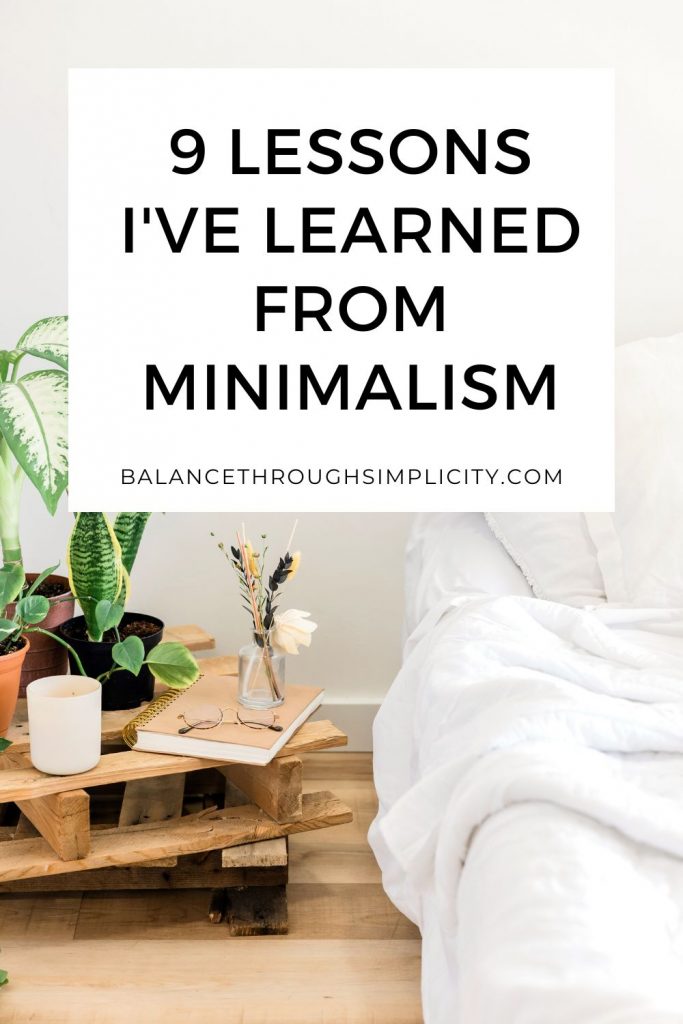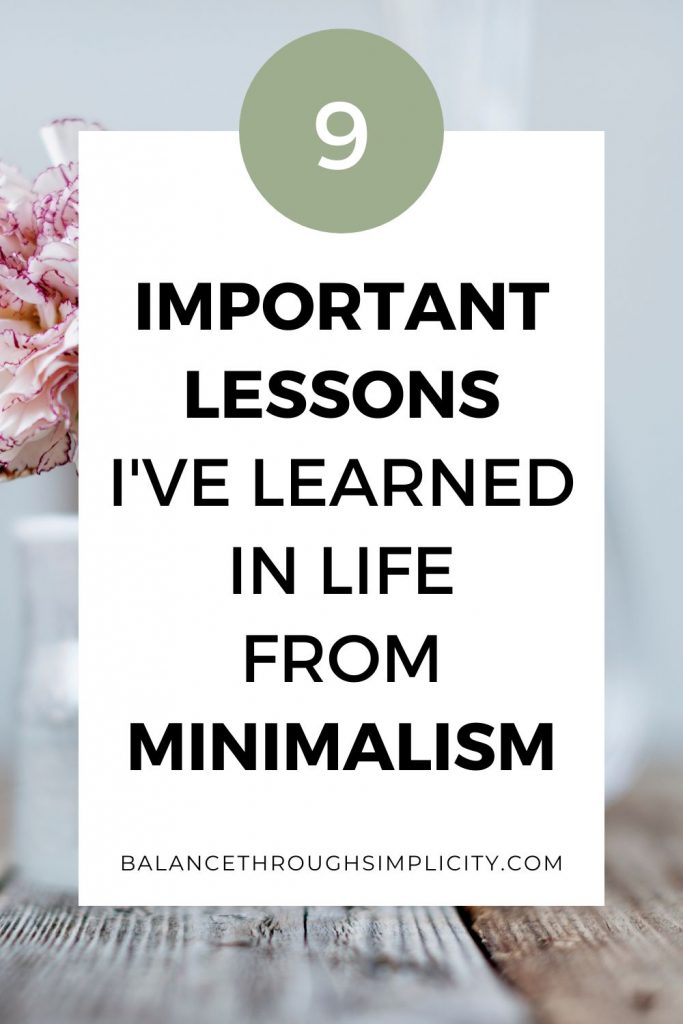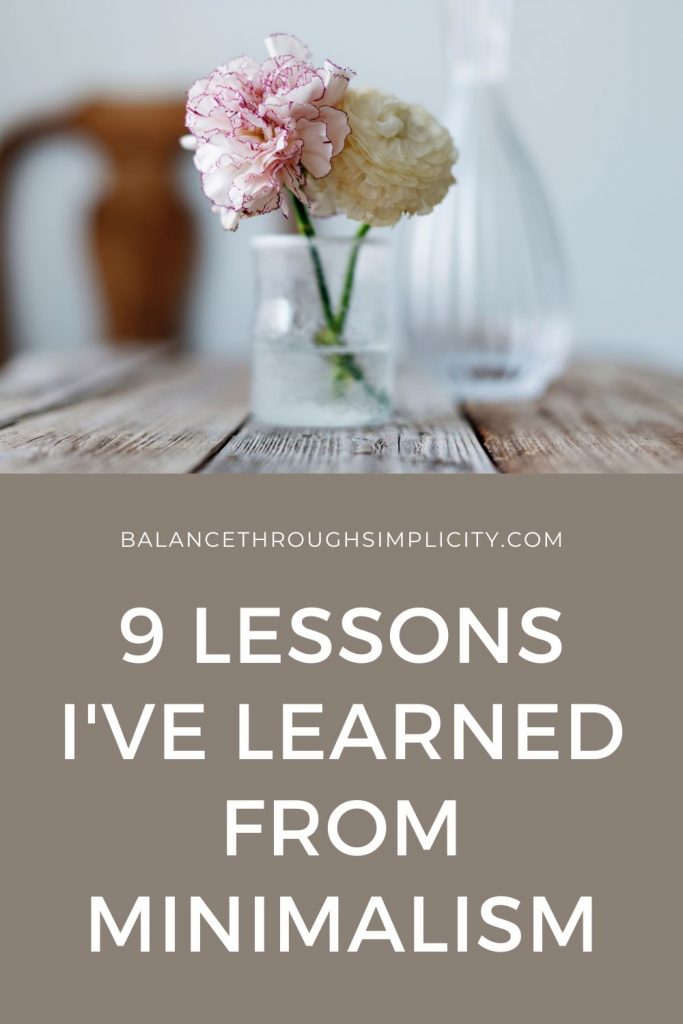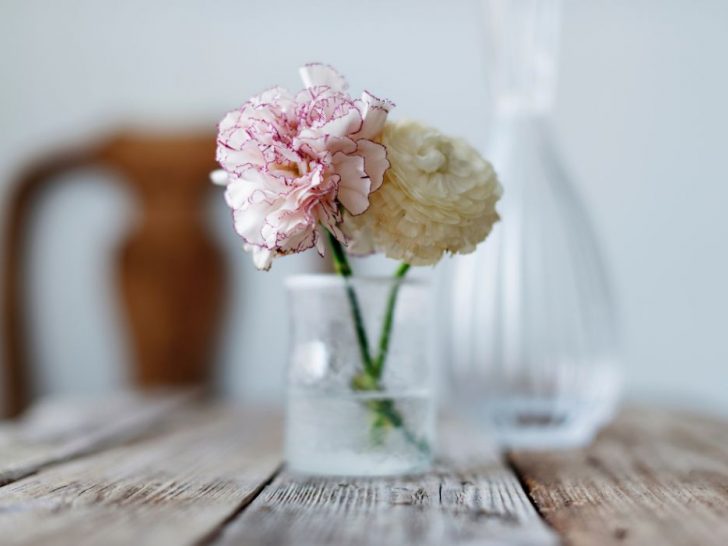9 LESSONS I’VE LEARNED FROM MINIMALISM
Minimalism gets some pretty bad press but I do think it’s provided me with some important lessons over the years which have helped me build a better life for myself and my family. I’m very grateful for all it’s taught me in so many ways! Here are 9 lessons I’ve learned from minimalism over the years.
THE BENEFITS OF MINIMALISM
Minimalism has had a profound impact on my life over the past 10 years. I haven’t been writing or sharing my experiences for all that time, but I have lived the benefits for nearly a decade and I’ve learnt a lot along the way!
I’ve found more time for what matters, an easier home to look after, better habits for taking care of myself and I spend money more wisely. I feel more content with what I have, take comfort in a slower and more deliberate pace of life and, if that life throws a challenge or two my way, I have wiggle room to adapt.
Aside from these benefits, I wanted to offer a personal perspective and share some of the lessons I’ve learned from minimalism. My own minimalist journey hasn’t been an easy road and I’d never want to give the impression that minimalism is the answer to every problem and a magic wand to make your problems disappear. Life happens to us all.
However, I did wonder if sharing the minimalism lessons I’ve learned over the years would be helpful to you in case you’re curious to try it for yourself.
9 LESSONS I’VE LEARNED FROM MINIMALISM
Here are 9 lessons I’ve learned from minimalism about myself, my life and my approach.
1. Minimalism isn’t for everyone
I do believe that everyone can benefit from minimalism. I think we could all benefit from more time, space and freedom to do more of what we want and less of just what we have to. I believe that the physical, emotional and psychological benefits of letting go of the weight of excess, expectation and chasing more, bigger and better are huge.
However, I also recognise that not everyone is in a position to prioritise change. Sometimes, life is just tough. We’re in the thick of financial, health, relationship, work and other worries and we just don’t have the bandwith to tackle something new.
Whilst I do believe that everyone can build a better life through minimalism, I think we have to be in the right mindset to be open to change. If you’re going through a tough season of life, your heart and mind aren’t receptive to new things or you have different priorities right now, there’s no pressure. Just come back to minimalism when you’re ready.
2. Minimalism isn’t about your stuff
When I write about minimalism I occasionally get comments about how could I live with bare walls and no colour. My home is far from bare and my life is certainly colourful in places but I’m still a minimalist.
The message I try to share is that minimalism isn’t really just about your stuff at all. Decluttering may be the first and most obvious place where most people begin their minimalist journey but that’s only a small portion of what minimalism is about. A minimalist life is really about enabling you to not think about your stuff at all.
My home is clear, tidy but not perfect. I have too many mugs in my kitchen cupboard and my kids could probably do with getting rid of some old books and toys they never play with. Yet, the stuff in our home isn’t a measure of how minimalist we are. I don’t have exact numbers of things and I don’t mind whether your home décor is white with house plants or big, bold, eclectic and bright.
Minimalism is about what you choose to fill your life with, not just your home.
3. Minimalism is about intention
The reason why I turned to minimalism is because I wanted more from life. Not less.
I wanted more time, more excitement, more ease, more space, more happiness, more fulfillment, more peace. I found this, not just by having less to think about, but mostly by being intentional. I made purposeful, deliberate, mindful choices about what I wanted from life. I decided what I wanted to keep in and what I wanted to keep out.
It was never a case of stripping my life back to the bare minimum, but rather about raising my awareness of what sort of life I wanted to build for myself and my family. I was fed up of just living with the status quo so I set about making intentional changes to create a better life.
“Minimalism is the intentional promotion of the things we most value and the removal of anything that distracts us from it.”
Joshua Becker
4. Minimalism requires courage
I hadn’t realised this at the outset but minimalism requires courage. Not only might you need to make some difficult decisions and changes, but you’re also going against the grain of modern, busy life.
When all around us we’re bombarded by messages that bigger, busier and more of everything is best then it’s a little counter-cultural to actively seek less. My friends and family, in the beginning, thought I was weird and that my little minimalist experiment would soon come to an end. But it didn’t.
I stuck with my plans to donate half my wardrobe, some of the kids’ toys, my pantry full of weird and wonderful spices that I never cooked with, my make-up that I never wore, my credit cards that supported pointless shopping sprees. I stuck with my plans to simplify my life because I knew that the long term gain was worth it.

5. Minimalism can’t be forced
Although I knew what I wanted to achieve and that, for me at least, minimalism was the tool to help me, I learnt never to force my minimalist goals on anyone else.
I would love for my husband to join me as I started my minimalist experiment, but he never did and still doesn’t really. He understands the benefit but hasn’t felt the need to embrace it like I do.
So, over the years, we talked about getting rid of stuff and how this would make space and time for other things. We discussed how I wanted to create a better life and that I could create more ease and happiness if I had less to worry about at home, in my schedule and in my brain.
I explained, my husband listened but ultimately we agreed a separate approach. I would declutter my stuff and the things in life that were in my domain or affected me personally but I would leave his stuff alone. If I try to force my opinion or declutter his stuff without agreement, it would inevitably backfire and he’d dig his heels in.
Minimalism is a personal choice and requires an open heart and mind like we mentioned above. Neither of these attributes can be forced. You may be ready, but it’s perfectly ok if you’re not!
6. Minimalism requires more self-reflection than action
Minimalism does require action, usually in the form of decluttering and getting rid of stuff! However, I was surprised by how much time and energy I spent in self-reflection than actually doing physical decluttering.
Decluttering is hugely popular and with good reason. It’s a great way to get rid of stuff which drains our time and energy to make our homes quicker and easier to look after and spend less time cleaning. However, minimalism is so much more than just a simple declutter.
Remember how we said that minimalism is about intention? Well, understanding your intention (knowing your choices, making decisions and the actions you take as a result) doesn’t just come to us as a flash of inspiration. Often it requires time, effort, meaningful conversations with our inner selves and more than a little bit of trial and error. Trying things out and seeing whether we like them or not.
Minimalism is about asking why you want to have X, buy Y, do Z. What do you want out of life? What would make it meaningful to you? Minimalism isn’t just about the act of getting rid of stuff. As we’ve already mentioned, it’s not even really about your stuff at all.

7. Minimalism has a warm heart
Minimalism is often portrayed as cold, stark, scarce, empty, dull. I don’t believe this to be true and, in fact, I think it’s quite the opposite.
If I’d carried on living my life as I was, struggling to raise my young family with a full-time job and days that left no time or energy for anything more than just getting through them, I know that inside I’d feel stark, empty and dull.
I wanted to believe that I had more to give to myself, more to offer to the world and definitely more that I needed to be to parent my kids in the best way I could. So, I chose minimalism to bring warmth, love, energy, happiness and presence to my life.
I wanted a way to be the best version of me that I could be. I wanted to be more engaged, calm, enthusiastic and full of life. I wanted to be there for my kids as wholly as possible, not just the remnants of me.
Minimalism helped me understand what was draining my energy, sapping my time, burdening my heart and cluttering up my mind. It’s a lifestyle choice that teaches compassion, encouragement, kindness and the importance of joy, gratitude, ease and peace in a world that seldom offers these things unless we intentionally seek them out for ourselves.
“Minimalism is about your values and vision for your life, not what your home looks like or how much stuff you have in your cupboards.”
Antonia Colins
8. Minimalism isn’t easy
Just chuck a few things out, paint your walls a neutral colour, buy a potted plant or two and wear the same type of outfit day in, day out. Stop buying new things and scrutinse your kitchen drawers for excess utensils. Grab yourself a decluttering checklist, subscribe to a minimalism blog and you’ll be minimalist before the day is out. Or not!
Minimalism isn’t easy is another of the lessons I’ve learned from minimalism in my own life. It’s tough to reflect on life, know what you want out of it and how to go about it. It’s even harder if you’ve got work, family and bills to pay that don’t allow you to press pause whilst you work out your next move.
Sometimes, you have to just make small, even tiny, changes that you hope will take you in the right direction and just trust in the process. Even then it’s quite possible that you’ll lose motivation, feel it’s too much of a blind leap of faith, or that it’s all a lot of fuss about nothing.
As we reflect on our life choices, the stuff that’s built up in our homes, the things that we wish we could change but don’t feel we can, it can feel tough, overwhelming, scary. What if we make a mistake, make a wrong choice, don’t keep it up? What if we don’t see or feel changes quick enough, or we don’t have the resources to make the changes we want?
Minimalism isn’t easy but, as the saying goes, nothing worth fighting for is easy. The trick is to make small changes in an intentional way and watch the momentum grow over time.
Easy? No. Possible? Yes. Worth it? For me, most definitely.
9. Minimalism is about values
If minimalism isn’t about your stuff, then what is it about? We’ve mentioned a few of those things already.
It’s about going against the norm, it’s about being purposeful, deliberate and intentional about your life and the choices you make. It’s about having the courage to do things differently and to love yourself and those around you enough to find a way to honour what’s most important. And therein lies one of the biggest lessons I’ve learnt from minimalism over the past few years.
Minimalism is about your values. It’s about defining your priorities in life and what’s most important to you and finding a way to honour those in your everyday. Make space for what matters by getting rid of everything that doesn’t.
And how do you know what matters?
Think about what will matter in 5 or 10 years. Not just tomorrow or next month. Where do you want to be, what do you want to have achieved, who do you want to spend that time with, what do you want to be doing with them?
How does your mindset affect your approach to life? How does your inner moral compass affect your choices? How do your core beliefs affect what you prioritise in your day? What is important vs what is most urgent and how do you distinguish between the two? What power does your stuff hold over you? What does your schedule say about your priorities?
These are just a few examples of how your values affect your life choices. Minimalism is about your values and vision for your life, not what your home looks like or how much stuff you have in your cupboards.

WANT TO GET STARTED WITH MINIMALISM?
These are just 9 lessons I’ve learned from minimalism but I’m sure there are plenty of others! If you’re curious to explore minimalism for yourself, here are a few ideas to get you started.
1. Get your free Declutter Starter Kit
Decluttering is a good first step. Clear some of your clutter to create breathing space in your home, schedule, heart and mind. My Declutter Starter Kit will give you some quick and easy tips for removing clutter in your home and life with confidence and ease. Pop your details in the box at the bottom of this article to get your free copy.
2. Journal your thoughts
As I mentioned, sometimes we need to just sit and reflect rather than act. So, I invite you to grab pen and paper and think about your responses to these journal prompts for decluttering. Most of us need motivation and a good reason for doing something so these questions might help you get clear on your ‘why’. This will make your ‘what’ and ‘how’ much easier!
3. Practice letting go
Getting rid of things feels difficult in a world where we’re encouraged to have more. Letting go creates space, in our home, schedule, heart and mind. Let go of things that hold you back and get in your way. Fill that space with things that lift you up and bring joy, peace, strength and positivity.
4. Be courageous
Taking action and making changes in life isn’t easy. It requires confidence, perseverance, motivation. If you decide to give minimalism a go, give it time to work. Start small, but make that start. Don’t be put off by people who think you’re weird. Don’t compare yourself to other minimalists but instead find your own version of minimalism that feels right to you and your life – as warm and compassionate or cold and crisp as you like!
SHARE YOUR THOUGHTS
Thank you for reading this article. I’ve enjoyed sharing these 9 lessons I’ve learned from minimalism. I’d love to know how you feel about minimalism too. What do you feel have been the greatest benefits or the biggest struggles? Do you find the term off-putting to begin with, or do you feel it’s helpful to have a label as a guide for what you’re trying to achieve? As a minimalist, what did you learn about yourself as you learnt to let go of stuff and clutter in your life? How have you changed as a minimalist? I’d love to know your thoughts if you’d like to share them.
MORE RESOURCES ON MINIMALISM
If you’d like to learn more about the minimalist lifestyle, here are some articles you might enjoy:
- Minimalism and Social Media: How to Use Social Media Mindfully
- Minimalism and Money: How Minimalism Can Help You Save Money
- Minimalist Lifestyle Tips: How to Embrace Minimalist Living Every Day
- Minimalism and Menopause: How the Minimalist Lifestyle Helps During Menopause
- What is Minimalism and a Few Things It’s Not
- 3 Gentle Things to Try if You’re Not Sure Minimalism is For You
DON’T MISS OUT!
I’m Antonia and on this blog I share practical inspiration to simplify your home, time and life. Follow me on Instagram, Facebook and Pinterest! You can also subscribe to Balance Through Simplicity and receive regular simplicity tips straight to your inbox for free. Make sure you never miss an article plus you’ll get a copy of my free Declutter Starter Kit as a welcome gift!


Laura
Sunday 23rd of July 2023
I had to laugh when I read 4. Minimalism takes courage: "my pantry full of weird and wonderful spices that I never cooked with, my make-up that I never wore, my credit cards that supported pointless shopping sprees"... *sticks hand up and waves it wildly*
I think for me the struggle, but also the benefit, of decluttering with the intent of having a more minimalist life, is digging out the reasons WHY I have so much of any one thing. Sometimes it's something I buy for "ideal me" (such as the one who actually likes cooking), sometimes it's a hedge against future lean times, and so on. But this is part of decluttering, too, as you've written before, Antonia. We have to let go of attitudes and beliefs that no longer serve us, just as we have to let go of physical clutter.
Balance Through Simplicity
Monday 24th of July 2023
Hi Laura, Yes I agree. Mindset is key and decluttering is no different, although it's probably easier to declutter a kitchen junk drawer than habits and behaviours learned over a lifetime!
Connie
Wednesday 8th of March 2023
Great article! Inspires me to become a better minimalist. However, maybe I'll get a potted plant....although your idea of a pot plant seems more fun! Thank you for the great article.
Balance Through Simplicity
Wednesday 8th of March 2023
Hi Connie. This made me laugh, it's not quite the lesson I was meaning to convey! I've changed it to read potted! Glad you liked the article!